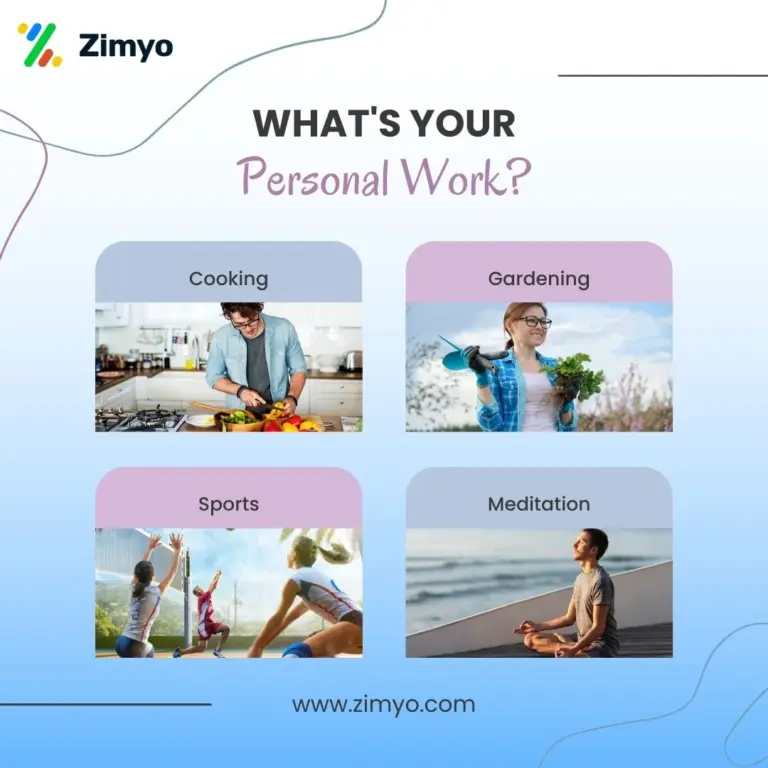What is Personal Work?

Let us understand this in simple terms.
Personal chores is anything you do to improve yourself or your life outside of your job. It’s about taking care of your body, mind, and relationships. This could mean:
- Doing daily chores like cooking or cleaning.
- Spending time on hobbies like painting or gardening.
- Learning something new, like a language or a sport.
- Taking care of yourself with activities like exercise or meditation.
Unlike professional work, which is focused on your career, private activities are all about your well-being and growth.
Personal Work Definition
Personal work refers to the activities and efforts individuals engage in outside of their professional responsibilities to improve themselves, their skills, and their overall well-being. This encompasses a broad range of pursuits aimed at personal development, emotional growth, and skill enhancement.
Examples
- Practicing yoga or meditation to stay calm and focused.
- Taking a cooking class or learning how to bake.
- Reading books to expand your knowledge or relax your mind.
- Spending quality time with family and friends.
- Reflecting on your goals and figuring out what truly makes you happy.
Personal vs Professional Work
While both work are important, they’re not the same. Here’s a quick comparison:
- Personal work is a task and activities related to managing one’s individual life. This includes daily chores, assignments, hobbies, and family responsibilities. It focuses on personal growth, self-care, and maintaining personal relationships.
- Professional work, on the other hand, involves responsibilities tied to one’s job or career. This includes completing job-related tasks, meeting deadlines, collaborating with colleagues, and contributing to the organization’s goals. Professional work is aimed at career advancement, skill development, and achieving professional success. This may bound the person with limits.
Let us understand both of these through an engaging tabular representation:
Aspect | Personal Work | Professional Work |
Purpose | Self-care, growth, and happiness | Career development and success |
Activities | Hobbies, family time, self-reflection | Tasks, projects, meetings |
Flexibility | Flexible and self-paced | Often structured and deadline-driven |
Balancing these two is the key to a happy and fulfilling life.
Why is Personal Work Important?
You might wonder, “Why should I spend time on personal chores?” Here’s why:
1. Improves Emotional Health
- Activities like meditation can help you manage stress and feel more in control.
- Being emotionally healthy makes it easier to connect with others and handle challenges.
2. Helps You Recharge
- It gives you a break from your job and prevents burnout.
- It’s like hitting the refresh button for your mind and body.
3. Makes You More Creative
- Learning new things or pursuing hobbies sparks creativity.
- A creative mind is better at solving problems and thinking outside the box.
4. Gives a Kick to Your Career
- Skills you gain from personal work, like learning a new language or improving your communication, can help you professionally.
- It shows that you’re always growing, which employers love.
5. Strengthens Relationships
- Spending time with loved ones makes your bonds stronger.
- Good relationships are a big part of a happy life.
What is Personal Work Leave?
Personal work leave is a type of leave employees take when they need time away from work for personal reasons. Unlike sick leave or vacation leave, personal chores leave is specifically for attending to obligations that cannot be managed outside working hours.
Examples include:
- Attending a family ceremony.
- Going to a bank for important paperwork.
- Medical check-ups or emergencies.
- Home maintenance or legal work.
From an HR perspective, this type of leave must be clearly defined in company policies. When personal work leave is paid, it should also be accurately reflected in the organization’s payroll system to ensure correct salary calculations. Many companies use platforms like Zimyo to manage leave records and maintain alignment between attendance, leave, and payroll data.
How to Manage Personal Work Effectively?
Managing personal activities doesn’t have to be complicated. Here are some easy tips to help:
1. Set Your Priorities
- Think about what’s most important to you, like spending time with family or picking up a new hobby.
- Focus on those things first.
2. Make a Schedule
- Plan time for personal work just like you do for your job.
- Use a calendar or an app to stay on track.
3. Keep Work and Personal Life Separate
- Try not to let work spill into your personal time.
- When you’re doing personal work, give it your full attention.
4. Use Technology to Help
- Apps like Duolingo can make learning a new skill fun and easy.
- Meditation apps like Headspace can help you relax and focus.
5. Celebrate Your Wins
- Whether it’s finishing a book or learning a new recipe, take a moment to feel good about your achievements.
Why Work-Life Balance Matters?

A perfect balance between work and life ensures that neither your job nor your private life suffers. Today’s fast-paced work culture often makes it hard to manage both. However, poor work-life balance can lead to:
- Stress and anxiety.
- Health problems.
- Lack of motivation.
- Poor job satisfaction.
On the other hand, when employees are given flexibility for personal work, they become happier, healthier, and more productive.
Read Our Blog to Fully Understand Work-Life Balance.
How Personal Work Helps Your Career?
Personal activity work isn’t just good for you; it can also help your career. Here’s how:
- Learning new skills can make you more qualified for exciting job opportunities.
- Improving emotional intelligence helps you work better with others and lead teams.
- Hobbies like public speaking can boost your confidence in meetings or presentations.
Tips for Balancing Work and Life
Here are some practical tips to manage your job and private work without stress:
1. Plan Ahead
Keep a calendar for work tasks and personal errands. Planning ahead helps avoid last-minute chaos.
2. Communicate with Your Employer
If you need personal work leave, inform your manager early and explain why it’s important.
3. Prioritize Tasks
Not all tasks are urgent. Decide what needs immediate attention and what can wait.
4. Set Boundaries
Avoid working during personal time. Similarly, don’t let personal issues interrupt your work unless necessary.
5. Use Technology Wisely
Use tools like reminders, calendars, and scheduling apps to stay organized.
6. Take Short Breaks
Small breaks during work reduce stress and improve concentration, leaving you with more energy for personal tasks later.
Personal work isn’t just about doing chores or taking up hobbies. It’s a way to invest in yourself and your future. By setting aside time for personal growth, self-care, and relationships, you’re building a foundation for a happy and successful life.
So, what are you waiting for? Start small—maybe with a hobby you’ve always wanted to try or a 10-minute meditation session. Stay consistent, and you’ll soon see how personal work transforms not just your day but your entire life. The best investment you can make is in yourself!
What does personal work mean?
It means tasks or responsibilities outside your job, like family or personal errands.
What is personal work leave?
It’s leave taken to handle personal matters that can’t be done outside work hours.
How many personal work leaves can an employee take?
It depends on company policy, usually a few days per year.
Why is work-life balance important?
It reduces stress and improves health, happiness, and productivity.
How can I balance personal work and job responsibilities?
Plan ahead, prioritize tasks, and set clear boundaries.




